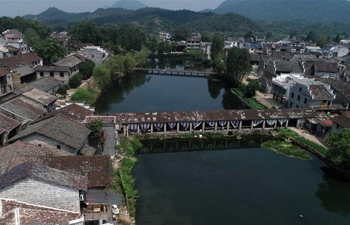HOHHOT, Aug. 28 (Xinhua) -- This summer, 10-year-old Zhang Yingyue traveled with his mother for more than 800 km to a grassland in northern China, just for a better view of the night sky.
The long trip was well worth it for Zhang, as the vast grassland free from light pollution proved to be an optimal site for observing the stars. Overnight, he found Scorpio, Pegasus, Ophiuchus and other constellations.
"Contemplating a sky full of stars from the grassland is really exhilarating," said Zhang, an avid stargazer who owns a telescope at home and follows social media accounts about astronomy on his mobile phone apps.
"The pleasure of looking at constellations in the night sky can never be found in books or on mobile phones," he added.
With the development of China's astronomy education and the space industry, there has been a growing interest in stargazing among Chinese people, especially the youngsters, stated Li Jian, president of the "Amateur Astronomer" magazine.
Ma Linquan from Beijing has been stargazing since she was three years old.
"When I look up at the stars, I have a better understanding of the eternity of time and the infinity of space," said the 12-year-old. "I can also feel how small I am, but I will keep exploring space."
Wu Shiying, a rural resident from Hubei Province, has become an amateur astronomer after watching a partial solar eclipse for the first time over three decades ago.
Over the years, Wu has also become a promoter of stargazing. He funded local schools to build an astronomical education base, and built a small observatory on the roof of his home in the mountains.
"In the cities, the sky view is often clouded by light pollution," said Wu, 70. "Only from our homes in the mountains can we see the amazing Milky Way."
Amid the stargazing boom, authorities and conservationists across China have made efforts in recent years to make the night sky sufficiently dark for star observation.
In 2014, China's first "dark-night" park was established in Ali Prefecture in the Tibet Autonomous Region. Following that, four more "night reserves" have been set up in Tibet and provinces of Shanxi, Jiangsu and Jiangxi.
In a lighting plan made public this April, the municipal government of Hangzhou proposed to designate nine "dark sky areas," where decorative lighting would be prohibited.
"We want to give our children the opportunity to be able to see the stars," said Wang Xiaodong, professor at the Zhejiang University and also the main author of the plan.
"The biggest dream of stargazers is to have a clear sky so that it seems like the stars are within reach," said Ma. "I hope one day I'll be able to see Orion from my balcony."

















